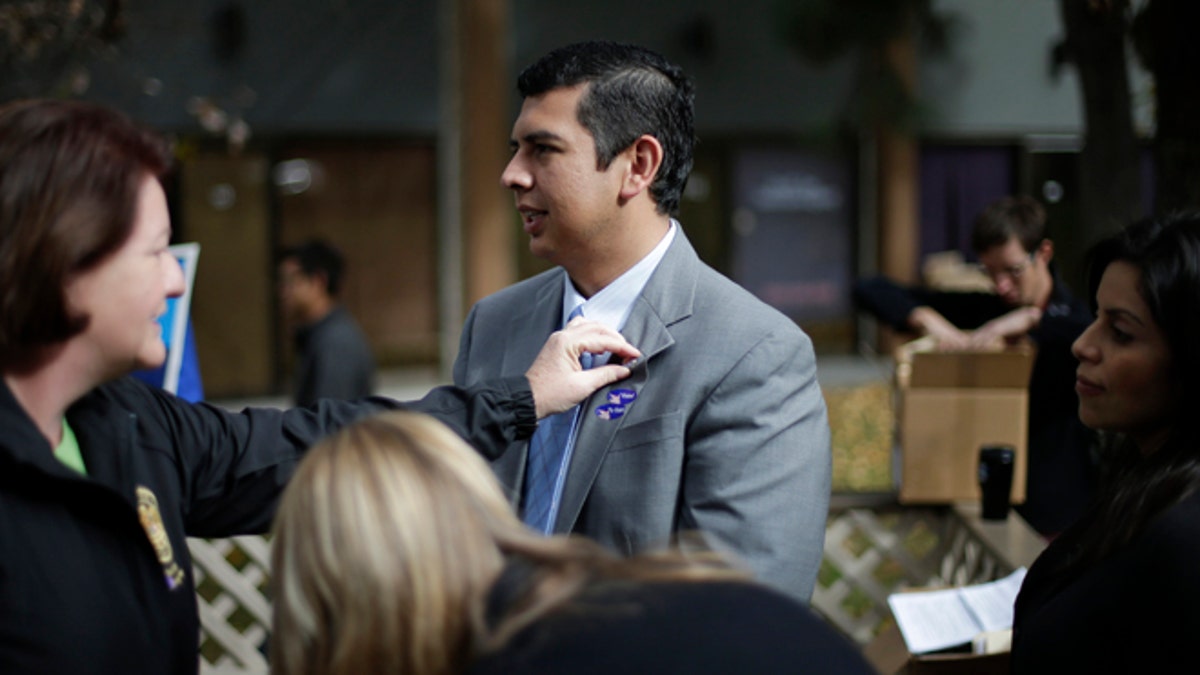
David Alvarez, center, a San Diego city councilman and Democratic candidate for mayor, stands while California Assembly Majority Leader Toni Atkins, left, adjusts a pin on his lapel as he meets with supporters Tuesday, Nov. 19, 2013, in San Diego. San Diegans head to the polls today to choose a new mayor, after Bob Filner's resignation amid allegations of sexual harassment has left the city with an interim mayor. (AP Photo/Gregory Bull)
San Diego (AP) – The city's burgeoning Latino population helped propel a native son and child of Mexican immigrants into a mayoral runoff against a fellow city councilman to replace the disgraced Bob Filner, who resigned amid sexual harassment allegations.
David Alvarez, a first-term Democratic councilman, began the short campaign with far less name recognition than some rivals but defeated them with heavy financial backing from organized labor and support in Hispanic communities.
He'll face Councilman Kevin Faulconer, who easily topped a field of 11 candidates Tuesday with 43.6 of the votes but fell well short of the majority needed to avoid a runoff.
A Faulconer victory in the election expected to be scheduled for February would allow Republicans to recapture an office they held for much of the past four decades and to govern a major American city, something that's become a rarity for the GOP.
Alvarez, 33, followed Faulconer with 25.6 percent. Nathan Fletcher, an executive at wireless technology titan Qualcomm Inc. and former state assemblyman, trailed with 24.3 percent.
Fletcher conceded Wednesday. Though about 34,500 mail-in and provisional ballots remained to be counted out of nearly 240,000 votes cast, Fletcher decided that wasn't enough for him to overtake Alvarez, who he endorsed.
San Diego elected a mayor barely a year ago only to see Filner resign less than nine months into a four-year term after nearly 20 women publicly identified themselves as targets of his unwanted advances, including kissing, groping and requests for dates.
He pleaded guilty last month to one felony count of false imprisonment and two misdemeanor counts of battery. He faces sentencing Dec. 9.
With the first round of balloting behind, Alvarez immediately sought to define Faulconer as a champion of entrenched business interests — the same line of attack that Filner adopted last year to become San Diego's first Democratic leader in 20 years.
"(Faulconer) is the establishment candidate," Alvarez told reporters after appearing at a rally of striking hospital workers. "He is the status quo. He is the downtown special interests, and we don't want to go back to that."
Faulconer, a two-term city councilman, said Wednesday he would distinguish himself from Alvarez by highlighting his deeper resume in city government and ability to work across party lines.
Faulconer said he would also highlight differences over economic and fiscal policy. He noted his opposition to a recent increase in developer fees to pay for affordable housing, a measure that Alvarez supported.
The 46-year-old former public relations executive must appeal beyond his Republican base to prevail in a runoff. Democrats hold a 13-point advantage over Republicans in voter registration.
"I'm a Republican in a majority Democrat district," Faulconer said. "I'm used to getting things done by working together with people."
Latinos are a key demographic, accounting for 28.8 percent of the city's 1.3 million residents, many of them living in hardscrabble neighborhoods south of downtown that Alvarez represents. They made up 15.5 percent of the voters in November 2012 elections, according to Michael Vu, San Diego County registrar.
Alvarez was the only one of six children in his family born in the U.S. His father came to the U.S. on the "bracero" program under which Mexican farm laborers harvested crops temporarily and later became a janitor. His mother was a fast-food worker.
"Latinos have started to come into their own in the last decade as far as a political force. Certainly David was a beneficiary of that," said John Nienstedt, who worked as a pollster on the Faulconer campaign.
Meantime, Fletcher's political future was uncertain after a second straight third-place finish for mayor. The 36-year-old Marine combat veteran became a Democrat in May, barely a year after bolting the Republican Party to become an independent.
Fletcher was endorsed by Gov. Jerry Brown, Attorney General Kamala Harris and law enforcement unions but weathered heavy attacks from the Faulconer and Alvarez camps.
"He had to fight a two-front battle," said Steve Erie, a political science professor at University of California, San Diego.
Follow us on twitter.com/foxnewslatino
Like us at facebook.com/foxnewslatino




